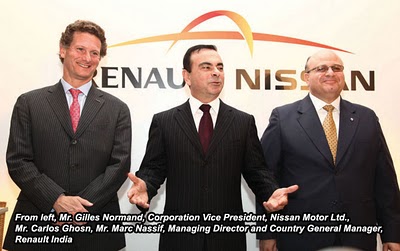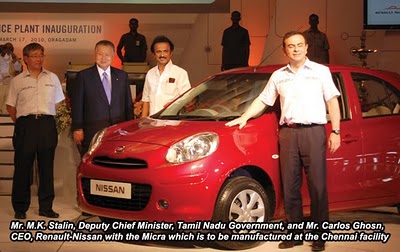Addressing a press conference in Chennai on the eve of the inauguration of the Renault-Nissan Alliance plant, Mr. Ghosn said the joint venture project doesn’t really want to be a niche player in India by selling imported cars but to develop into a full-fledged player through local manufacturing with locally sourced parts. The initial plant capacity of 200,000 cars by 2012 will be scaled up to 400,000 cars in 2015. The partnership philosophy in India would be based on sharing of technology and experience with the partner who, in turn, would bring in frugal engineering and product planning, thus improving the potential to produce vehicles for the developing markets.
It may be recalled that Mr. Ghosn signed a series of joint ventures during his Indian visit two years ago, identifying potential partners for both Renault and Nissan in the Indian market. In a short while, he became the poster boy of the automotive industry in India. The agreements signed were for the JV with Mahindra and Renault to manufacture Logan, the tie-up with Ashok Leyland and Nissan for LCVs and with Bajaj for developing an Ultra Low Cost (ULC) car, and a pact for setting up of a green field facility in Chennai jointly by Renault-Nissan and Mahindra. There have been a lot of developments over the last two years, and things have really not progressed the way Mr. Ghosn would’ve wanted. The JV with Mahindra for the Logan project has not met with much success. Also Mahindra, which was one of the partners in the setting up of joint manufacturing facility in Chennai, withdrew its plans later. With the global recession spreading fast, the AL-Nissan JV slowed down, and the plan to set up an independent manufacturing facility was put on hold. The Bajaj ULC project too remains uncertain.
There have been a lot of developments over the last two years, and things have really not progressed the way Mr. Ghosn would’ve wanted. The JV with Mahindra for the Logan project has not met with much success. Also Mahindra, which was one of the partners in the setting up of joint manufacturing facility in Chennai, withdrew its plans later. With the global recession spreading fast, the AL-Nissan JV slowed down, and the plan to set up an independent manufacturing facility was put on hold. The Bajaj ULC project too remains uncertain.
It is against this backdrop that Mr. Ghosn had a lot of questions to answer. Referring to the JV with Ashok Leyland for LCVs, Mr. Ghosn said that the project is reaching fruition. The first product from the JV, to roll out by 2011, will be from the existing locations of the partners, namely, the Renault-Nissan plant in Chennai and possibly the Chennai or Hosur unit of Ashok Leyland. The greenfield project for the new product, which remains frozen due to the global crisis, would be resumed as soon as the market conditions improved. The first prototype of the vehicle to be launched in the Indian market through the JV was recently presented to the Director of the JV.
Mr. Ghosn also confirmed that negotiations with Ashok Leyland for a possible small car project have just been initiated.
On the ULC car project with Bajaj Auto, he observed that the project work is in progress and the car would be manufactured jointly with Bajaj. More details on the project would be announced after a formal contract is signed with Bajaj. There are, however, no plans to produce this car at the Chennai facility.
With regard to the company’s JV with Mahindra for the Logan project, Mr. Ghosn said: “We are not very satisfied with the evolution of our sales with Logan but this is something that we have shared with our partners and both agree on the same. It is mutually agreed by both the partners that the market response to the Logan has been below expectations. There are discussions at this point for the repositioning and further simplification of the car and it looks like we need to be more nimble and little fast with the market. As soon as these discussions reach a conclusion they will be announced. Until then the Logan will stay on the roads and will continue its regular life cycle in the country”.
Mr. Ghosn further made it clear that he wants to build cars locally in order to become a volume player rather than a niche player. “India is in our opinion going to be one of the largest car markets in the world. Currently the market size is around 2 million cars a year and there is potential for the market to cross the 5 to 6 million mark in the next 5 to 10 years. The global market is also slowly shifting from west to east and from north to south and we want to play an important role in this market development. India is a complex market and we need to be attentive to its evolution, we need to make sure that in terms of products, in terms of performance we are always fine tuning and adapting our products if we want to be contributing to this market and be competitive. We want use the Indian resource to be competitive in the global market”.
Regarding new model introductions in the small car segment, he said: “The Micra is coming at a very important segment in the Indian market which is the B+ market. Below the B+ we have the B, A and A-segment. We have so far nothing in all these categories and this represent more than 50% of the total market size. More importantly, it represents a big percentage of the market in many developing countries. We are addressing not just the Indian but many developing countries where people would like to buy cars at affordable price”, added Mr. Ghosn.
On the new Chennai plant, he said: “The new plant in Chennai has been established with a capacity to manufacture 400,000 cars, In the first phase the company hopes to achieve a volume of 200,000 units by 2012 out of which more than 50% of the capacity will be exported and the balance will be sold locally. Apart from the Micra, the company plans to assemble 3 Nissan products and 2 Renault products in the Chennai plant”.
